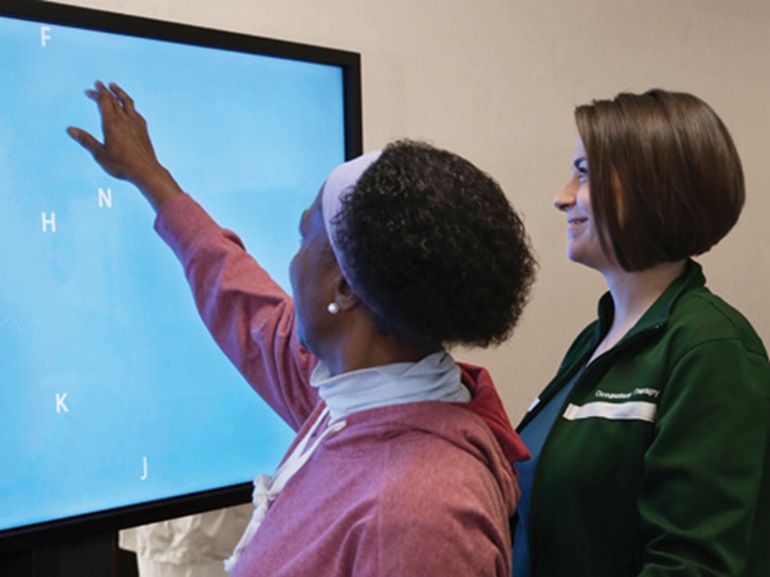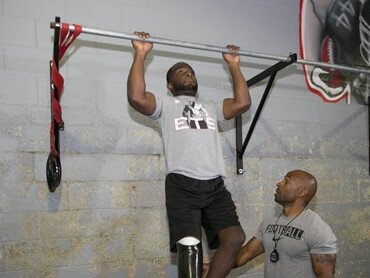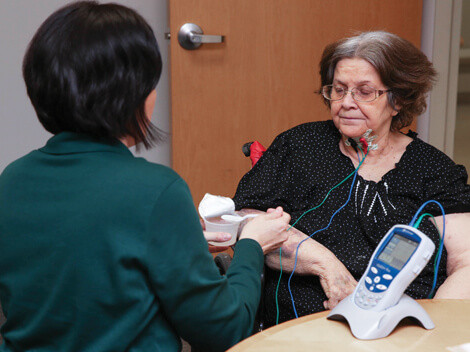Brain Injury Rehabilitation

Expert level care
Helen M. Simpson Rehabilitation Hospital’s brain injury rehabilitation program focuses on improving your quality of life. Our team works closely with the acute care hospital team to ensure a smooth transition to our rehabilitation hospital and the next phase in your recovery process.
We apply evidence-based best practices to support your recovery. Our approach includes high touch and high tech methods of rehabilitation during your three hours of therapy per day, five days per week.
-
We draw on the knowledge of an experienced team of brain injury specialists to address the range of medical, physical, functional and emotional issues you face.
This interdisciplinary team is led by a physiatrist, a physician board-certified in physical medicine and rehabilitation and includes rehabilitation nurses; physical, occupational and speech therapists; dietitians; case managers; and other clinical and support staff, as needed.
Family members are a part of the care team, too. It’s important for your family to be involved in your therapy sessions, and to learn about your condition and how to support you on the path to recovery.
-
Treatment is carefully integrated and tailored to your specific needs and goals. Depending on how you have been impacted by your injury, we will help:
- Maximize alertness and responsiveness
- Improve sleep/wake cycles
- Develop new cognitive, communication and behavioral strategies
- Improve physical function, balance and mobility
- Manage pain and spasticity
- Improve vision, speech and/or swallowing difficulties
- Enhance the skills needed to perform daily activities
- Overcome psychological and social challenges
- Return home and resume work, school or community activities with as much confidence and independence as possible
-
Helen M. Simpson Rehabilitation Hospital works closely with you, your family and the referring hospital to ensure a smooth transition to our program.
Here, you will benefit from a minimum of three hours per day of physical, occupational and/or speech therapies, five days a week. The skills and strategies you learn in therapy will be reinforced by your nursing team.
Treatments include:
- Mobility skill training such as transfers, standing and/or walking
- Strengthening exercises for arms and legs, along with the assistance of robotic equipment
- Tactics to improve communication, swallowing or vision difficulties
- Daily living activities including dressing, feeding and bathing
- Strategies to improve memory, concentration, judgment and problem solving
- Medication management
- Caregiver education and training
At the appropriate time, we’ll coordinate your discharge, help arrange for equipment and provide access to community resources that may be available to you. Our goal, like yours, is for you to move forward with as much independence and confidence as possible.
-
Aquatic therapy is a safe, effective form of rehabilitation for those who may have difficulty exercising on land.
The buoyancy of water supports the body helping ease an individual’s fear of falling and promoting mobility, balance, strength and improving gait. Buoyancy, resistance and heat are some of the key elements that make aquatic therapy ideal in addressing balance, upper and lower extremity stretching and walking progression. Our pool is heated, wheelchair-accessible and equipped with gait observation cameras.
Our care team will determine whether you may benefit from aquatic therapy.
*Please note: aquatic therapy is not currently being offered due to COVID-19 restrictions. We hope to offer it again in the near future.
-
To help you return home and resume work, school, community and/or social activities, Helen M. Simpson Rehabilitation Hospital provides an unparalleled continuum and continuity of care. We are here to help you manage your health from inpatient to outpatient care.

Technology and research drive recovery

Helen M. Simpson Rehabilitation Hospital balances hands-on treatment with the use of cutting-edge technologies to support your individual recovery. We also continue to research, learn and apply the most promising new avenues of care.
Below are some of the advanced technologies available to appropriate patients:
- Robotic, weight-supported training and electrical stimulation devices to improve balance, gait and walking
- Computer-based exercises to improve memory, concentration, decision-making and other cognitive skills
- VitalStim®, a non-invasive external electrical stimulation therapy, applied to the neck, to treat swallowing disorders
- Interactive gaming and other computer-based platforms
Brain Injury Recovery
We will work closely with you, and your family, physician and/or the referring hospital to ensure a smooth transition to Helen M. Simpson Rehabilitation Hospital for your rehabilitation.